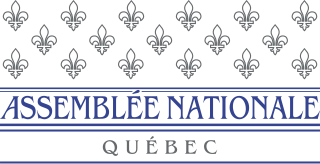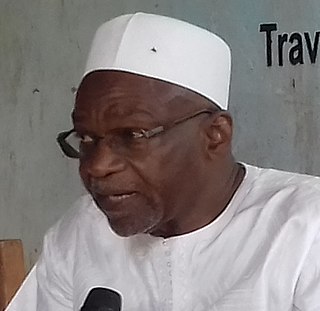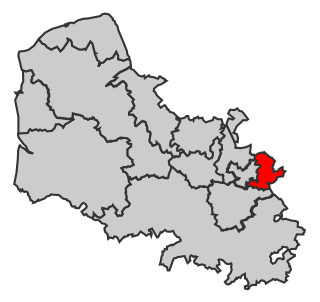
The president of France, officially the president of the French Republic, is the executive head of state of France, and the commander-in-chief of the French Armed Forces. As the presidency is the supreme magistracy of the country, the position is the highest office in France. The powers, functions and duties of prior presidential offices, in addition to their relation with the prime minister and government of France, have over time differed with the various constitutional documents since the Second Republic.

Vaucluse is a department in the southeastern French region of Provence-Alpes-Côte d'Azur. It had a population of 561,469 as of 2019. The department's prefecture is Avignon.

The National Assembly is the lower house of the bicameral French Parliament under the Fifth Republic, the upper house being the Senate. The National Assembly's legislators are known as députés, meaning "delegate" or "envoy" in English; etymologically, it is a cognate of the English word deputy, the standard term for legislators in many parliamentary systems.

The Action démocratique du Québec, commonly referred to as the ADQ, was a right-wing populist and conservative provincial political party in Quebec, Canada. On the sovereignty question, it defined itself as autonomist; it had support from nationalists and federalists. Its members were referred to as adéquistes, a name derived from the French pronunciation of the initials 'ADQ'.

The National Assembly of Quebec is the legislative body of the province of Quebec in Canada. Legislators are called MNAs. The lieutenant governor of Quebec and the National Assembly compose the Legislature of Quebec, which operates in a fashion similar to those of other Westminster-style parliamentary systems. The assembly has 125 members elected first past the post from single-member districts.

The Third Republic of the Democratic Republic of the Congo is a unitary state with a five-level hierarchy of types of administrative division. There are nine different types of country subdivision in a new hierarchy with no new types but with two from the previous one abolished.

The Ralliement créditiste du Québec was a provincial political party in Quebec, Canada, that operated from 1970 to 1978. It promoted social credit theories of monetary reform, and acted as an outlet for the expression of rural discontent. It was a successor to an earlier social credit party in Quebec, the Union des électeurs which ran candidates in the 1940s.

Mamadou Tandja was a Nigerien politician who was President of Niger from 1999 to 2010. He was President of the National Movement for the Development of Society (MNSD) from 1991 to 1999 and unsuccessfully ran as the MNSD's presidential candidate in 1993 and 1996 before being elected to his first term in 1999. While serving as President of Niger, he was also Chairman of the Economic Community of West African States from 2005 to 2007.
The dissolution of a legislative assembly is the simultaneous termination of service of all of its members, in anticipation that a successive legislative assembly will reconvene later with possibly different members. In a democracy, the new assembly is chosen by a general election. Dissolution is distinct on the one hand from abolition of the assembly, and on the other hand from its adjournment or prorogation, or the ending of a legislative session, any of which begins a period of inactivity after which it is anticipated that the same members will reassemble. For example, the "second session of the fifth parliament" could be followed by the "third session of the fifth parliament" after a prorogation, but would be followed by the "first session of the sixth parliament" after a dissolution.

Saleh Kebzabo is a Chadian politician. He is the President of the National Union for Democracy and Renewal (UNDR) and a Deputy in the National Assembly of Chad. He was designated Prime Minister by president Mahamat Déby on 12 October 2022.

The National Movement for the Society of Development, also known as the National Movement for the Development of Society is a political party in Niger. Founded under the military government of the 1974–1990 period, it was the ruling party of Niger from 1989 to 1993 and again from 1999 until 2010, when a coup on 18 February 2010, by a military junta called the Supreme Council for the Restoration of Democracy (CSRD), ousted President Mamadou Tandja.

The People's National Assembly is the lower house of the Algerian Parliament. It is composed of 407 members directly elected by the population. Of the 407 seats, 8 are reserved for Algerians living abroad. Members of the People's National Assembly are directly elected through proportional representation in multiple-member districts and serve terms lasting five years at a time. The last election for this body was held on 12 June 2021. The minimum age for election to the Assembly is 28.

The unicameral Assemblée nationale or National Assembly is Guinea's legislative body. Since the country's birth in 1958, it has experienced political turmoil, and elections have been called at irregular intervals, and only since 1995 have they been more than approval of a one-party state's slate of candidates. The number of seats has also fluctuated.

The prime minister of Cambodia is the head of government of Cambodia. The prime minister is also the chairman of the Cabinet and leads the executive branch of the Royal Government of Cambodia. The prime minister is a member of parliament, and is appointed by the monarch for a term of five years. Since 1945, 37 individuals have served as prime minister; 33 as official prime ministers, and 4 in acting capacities. The current prime minister since 2023 is Hun Manet.

Emmanuel Dubourg is a Canadian politician, chartered accountant and teacher from Quebec. He was the Member of National Assembly of Quebec for the riding of Viau from 2007 until 2013. On November 25, 2013 he was elected to the House of Commons of Canada in a by-election to become the Liberal Member of Parliament for the Montreal riding of Bourassa.
Events from the year 1958 in France.

The 11th constituency of the Pas-de-Calais is a French legislative constituency in the Pas-de-Calais département. It elects one député to the National Assembly. It has been represented by Marine Le Pen since 2017.

Senators in France are elected by indirect universal suffrage, by a panel of "electors". Half of the Senate seats are up for election every three years; the term of office is six years.

The president of France is elected by direct popular vote to a five-year term. If the office falls vacant before the end of five years, an election to a new five-year term is held, generally within 20 to 35 days of the vacancy.

The 15th legislature of the French Fifth Republic was the French Parliament that was in office from 27 June 2017 until 21 June 2022. The party of President Emmanuel Macron, La République En Marche! (LREM), obtained an absolute majority of 308 deputies, alongside its ally, the Democratic Movement (MoDem), which secured 42 seats. The newly installed deputies elected François de Rugy as President of the National Assembly when the National Assembly first convened on 27 June. The legislative election saw a record level of renewal, with only a quarter of the deputies elected in 2012 also elected in 2017, as well as a significant increase in the representation of women and youth. With seven planned parliamentary groups, it would be the most fragmented National Assembly since 1958.
















